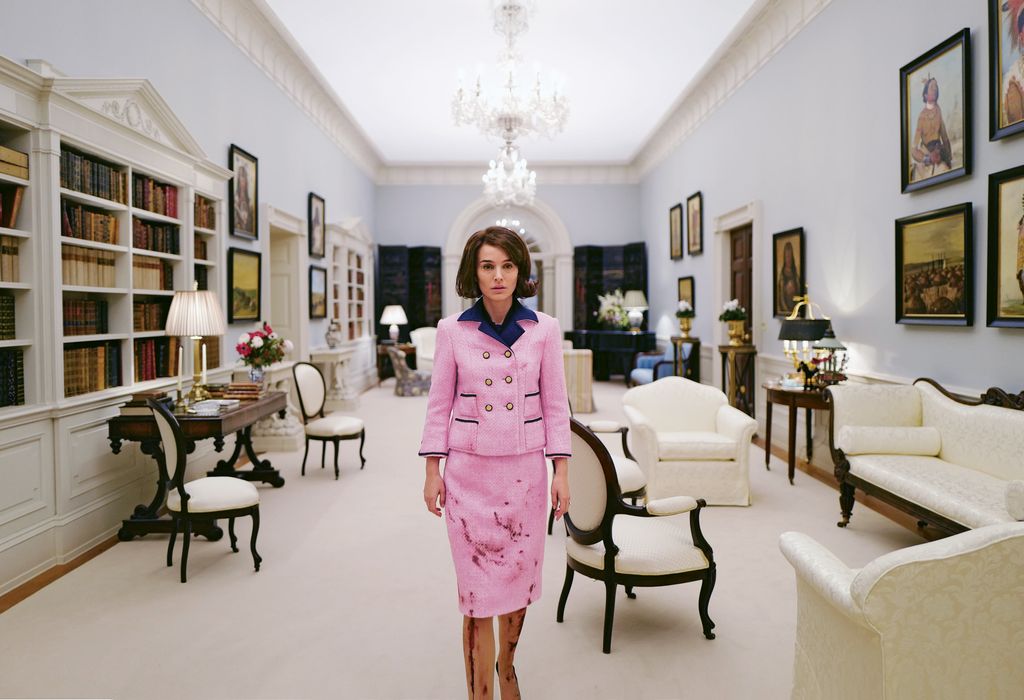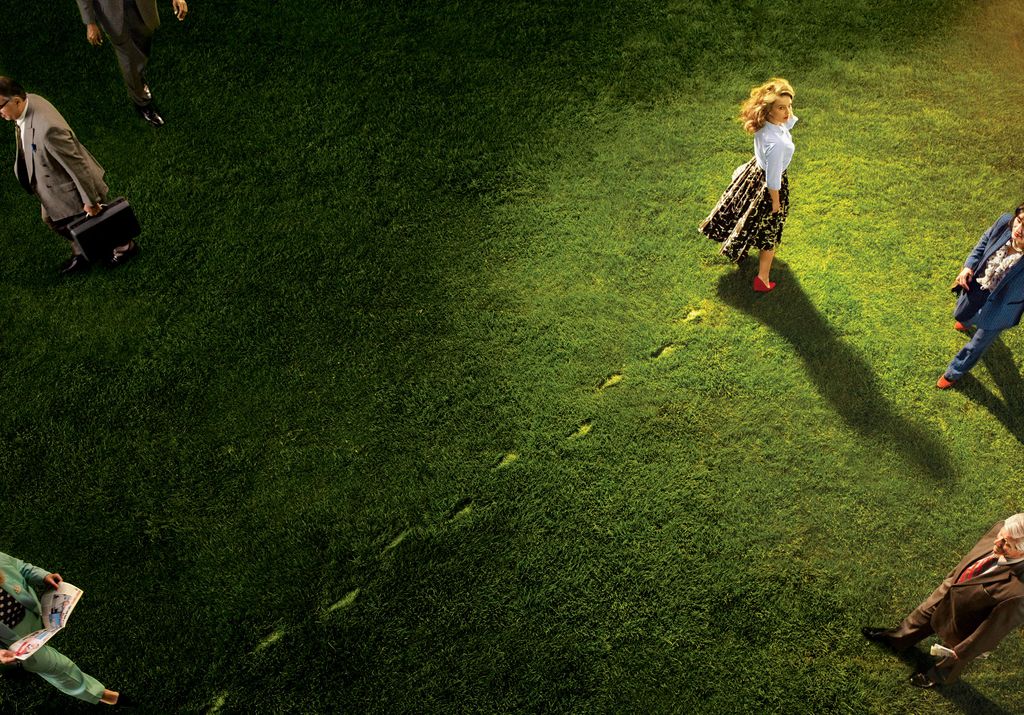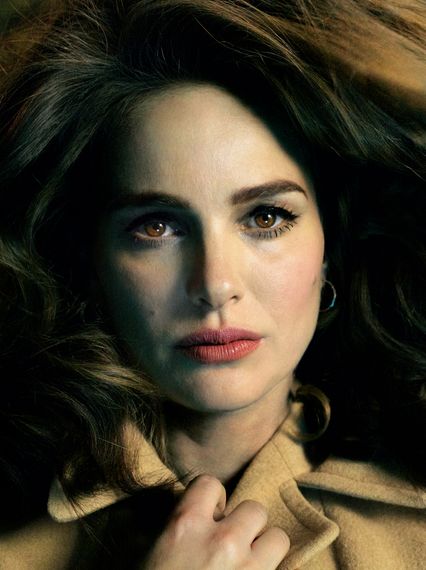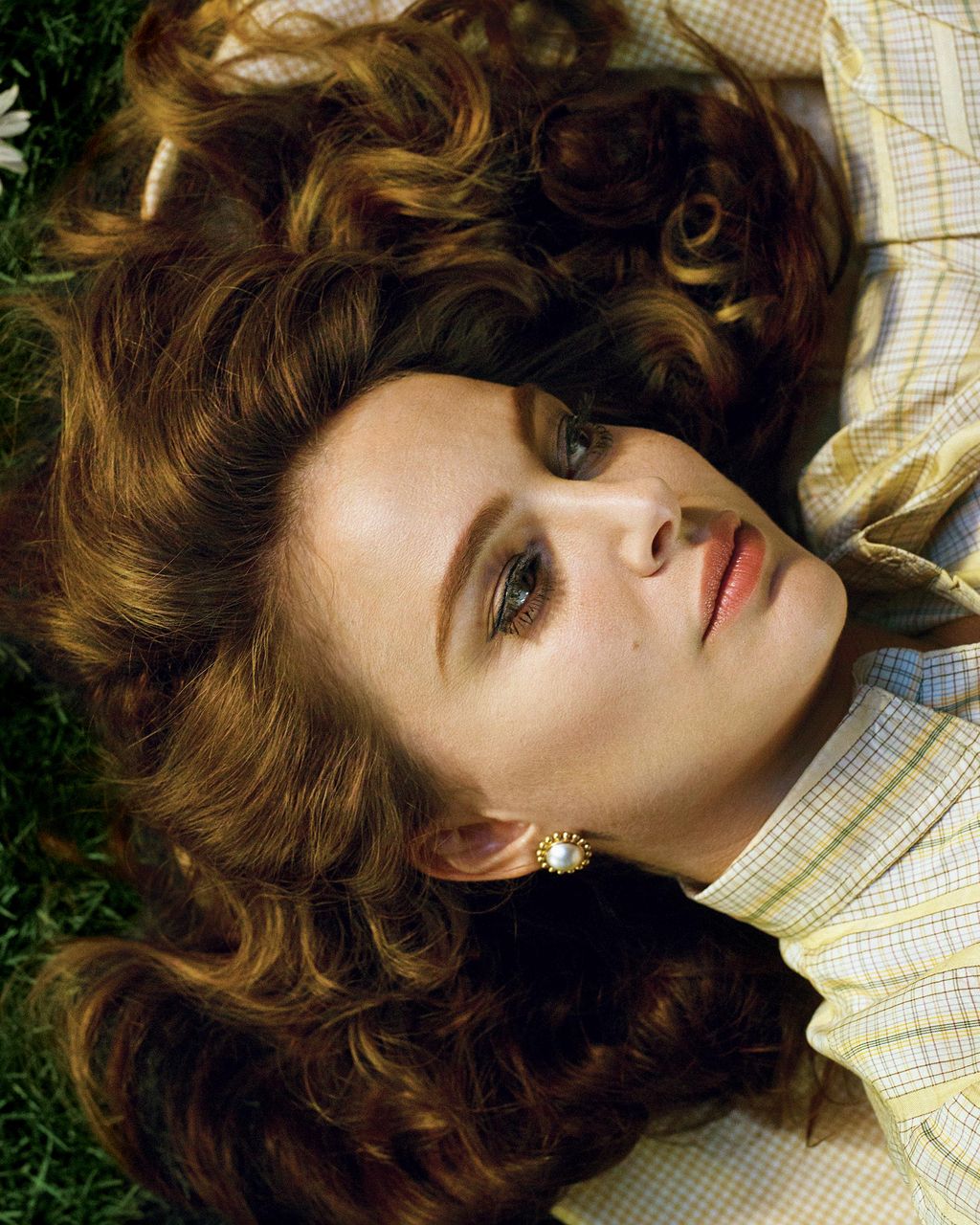When Natalie Portman finally committed to starring in Jackie, a jarringly intimate portrait of Mrs. Kennedy’s life just after JFK’s murder, her parents gifted her with a valuable piece of research. One Special Summer was a limited-edition, book-length travelogue of scraps, scribblings, and illustrations written and drawn by a young Jacqueline Bouvier and her sister, Lee, during a 1951 tour of Europe. “It’s so funny — you just see these two wild girls having a great time,” says Portman. “It was really helpful to get this sense of who she was before.” By which she means, of course, before adulthood — before Jackie married into a political dynasty; before she lost her husband, her home, and her power in one fatal shot; and before she rapidly summoned the strength to enshrine not only JFK but also the undying myth of his administration as “Camelot,” a nickname Jackie was the first to use.
Born in Israel and having recently returned to Los Angeles after two years in France (her husband, Benjamin Millepied, was directing the Paris Opera Ballet), Portman feels a visceral connection to Jackie’s formative months abroad. “It’s thinking back to when you’re a young person, remembering that essential self,” she says. “That time in Europe totally affected the way she was as a First Lady.”
History made Jackie an icon, but Portman plundered its primary sources to unearth her human side, rummaging through the records and artifacts of a life utterly alien to the actress but eerily familiar as well. Jackie was 34 at the time of the assassination; Portman is 35, and she sees in Jackie’s precocious and visible life elements she might recognize in her own: a series of performances, public and private, traditional and sometimes transformative — and always attuned to the world that is watching. “She was very ahead of her time in having the kind of agency to tell her own story,” says Portman. “That’s everyone’s obsession now, presenting this image that they want to show the world. That was relatively forward-thinking of her, and the fact that she coined ‘Camelot’ is crazy.”
Portman’s version of Jackie is a woman who’s privately brash, secretly terrified, and publicly a lacquered black box. “She was an incredibly mysterious person, and I think Natalie has that in her eyes,” says Jackie director Pablo Larraín. “That’s why I wanted so many close-ups.” Portman’s polyglot charm, dancer’s poise, and eminent cheekbones compelled a writer to call her “the Jewish Jackie Kennedy.” In real-life close-up, she’s approachable and distractedly chummy. The day we meet, she wears a tight ponytail and a smart maternity polka-dot blouse. An expected sibling to Aleph, her 5-year-old son, rounds her belly. At one point, she feels a series of kicks and says, “It’s pretty funny all the things you experience while being beaten up from the inside.” From across an L.A. boulevard, she could easily pass for a typical Bobo Angeleno mom. But when she pulls down a pair of Dior sunglasses to obscure those famous and mysterious eyes, you begin to see the icon, too.
Even more than most films, Jackie owes its existence to a blend of accident and persistence. In 2010, the year he released Black Swan,Darren Aronofsky acquired a script about Jacqueline Kennedy’s week of disturbingly public mourning. Aronofsky planned to direct his wife, Rachel Weisz, until they divorced and she left the project. He stayed on as a producer, and Portman became interested in 2012. But the 50th anniversary of JFK’s death in 2013 brought a glut of projects, and the only viable path for Aronofsky and Portman was to take their time and find a new director who would make Jackie stand out.

Portman and her producers rejected multiple suitors. Then last year, Aronofsky led the jury of the Berlinale film festival, which awarded Pablo Larraín’s The Club, about a group of bad priests in a secret halfway house, its Grand Jury Prize. Aronofsky offered to send Larraín the Jackie script. “I thought it was just party talk,” says Larraín. What would a young Chilean filmmaker know about an American historical figure? But Aronofsky followed through, and after Larraín read it, he said he would only do it with Natalie Portman. He didn’t know she was already involved.
Larraín met Portman in Paris (where they did most of the shooting, allowing her to stay close to home). When he talked about the role, “it almost felt like a dare,” Portman says. “He kept saying, ‘Either we both do this and we jump in, or we don’t and we both walk away.’ ” Larraín told her he would ask the writer, Noah Oppenheim, to cut every scene in the script that didn’t include her. “I remember she sort of opened her eyes wide,” he says. “I guess that’s frightening for an actor. But at the same time it’s challenging, and Natalie’s a real artist and she takes risks.”
Portman’s Jackie is definitely a risk — maximal where others might be meek, and boldly alienating where they might reach for the familiar. “It’s not subtle, right?” says Peter Sarsgaard, who plays Bobby Kennedy. “If an actor’s giving a safe performance, no one in the room except the person they’re talking to can even hear them. But when an actor’s out on a limb like that, you think, God bless you for having the guts to go for it. I wasn’t like, This is a slam dunk. I didn’t feel like that for any of us. I thought, If it fails, it will fail nobly.” He was reminded of Daniel Day-Lewis in There Will Be Blood. “You can imagine being on that set going, What is this man doing? But by the middle of that movie, you’re entirely used to it. I think Natalie actually does it one step further. The first couple of lines, you’re like, Oh, we’re going there, and then you just trust her. Acting is a confidence game, and if you seem like you know what you’re doing, the audience will go with you.”
Watch old clips of Mrs. Kennedy — especially her televised tour of the White House, pieces of which Larraín re-created verbatim — and your first impression is of a Stepford wife programmed by aliens who’d seen too many studio-system romances. “It’s not an accent that anyone else has,” says Portman. “It’s this mix of mid-Atlantic faux-British that must have been from finishing school and a real kind of Long Island ‘tawk.’ Half of it is people I grew up with, and half is like Katharine Hepburn. But it was great to have it, because it felt like a diagram of her past.” It was also a map of her several personae, each calibrated to a different audience. Portman especially relished Jackie’s taped interviews with Kennedy friend Arthur Schlesinger. “She was drinking a lot — you hear the ice in the glass,” she says. “Her voice was lower, more sarcastic, funnier, faster than her public appearances.” Those tapes were scavenged for additions to the script.
Larraín’s process was as fragmented as Portman’s approach. He didn’t do rehearsals so much as initiate conversations about mood and material. He told the actors not to worry about emotional continuity; the scenes would be presented out of order. “All your job was,” says Sarsgaard, “was to be there with each other.”
The Jackie of Jackie is of course sympathetic — racked with psychic pain, forced to pack up her belongings while Lady Bird Johnson flips through fabric swatches. But she also insists, against all advice, on a horse-drawn, Lincolnesque funeral procession within the sniper sight lines of a hundred potential Oswalds. She is strong-minded but also ego-driven and almost suicidally reckless. “You have these different aspects of her that don’t just make her our hero,” says Portman.
In conversations with other characters — a priest, a journalist, and a childhood friend played by Greta Gerwig — Jackie comes off smarter, darker, and often drunker than the one we’ve known. “In our popular consciousness,” says Billy Crudup, who plays the journalist, “she’s essentially a photo history attached to a pantomime of youthful power, tragedy, and perseverance. To see it in the form of raw, elemental, banal, and loving moments is quite challenging to that iconography.” Yet Jackie understands and advances the iconography under almost unbearable stress. “Your mourning period is also an identity crisis, is also a crisis of faith, is also a moment when you have to leave your home,” says Portman. “And it’s also a moment when even as a member of the nation, not as a private person, everyone was just scared out of their minds.” In the part of America that admires Kennedy most, in 2016, that fear certainly resonates. So does the notion that Jackie’s obsessive decorum wasn’t just frippery but a powerful assertion: that dignity matters.
So the artist is the man with his pants off,” Portman says, staring bemusedly at a video by L.A. multimedia artist Kenneth Tam. It’s November 1, the Day of the Dead, and Portman has chosen to spend the morning on a tour of “Human Condition,” a morbid group exhibition in an abandoned Los Angeles hospital. For his videos, Tam finds men on Craigslist, puts them inside a cardboard box, and tells them he’ll do whatever they tell him to do — essentially making them directors of films starring himself. At the moment, we’re watching a disembodied hand palpate Tam’s nooks and crannies. “I need to move on,” Portman says with a sharp laugh. “I’m feeling uncomfortable.”
We make our way to a cavernous kitchen, which another artist has smothered in a Pepto-Bismol shade of appetite-suppressive pink. “Good for him, because no one can buy that,” she murmurs out of the curator’s earshot. “The art market has become so crazy that a lot of it is junk to me. It’s actually a bold choice now to do something that cannot be commodified.”
Like so many acting careers, Portman’s has oscillated between art and commerce. She’s played a 12-year-old coquette in The Professional, a delusional ballerina in Black Swan,and a pink-haired stripper in Closer. She’s also been a green-screen space queen in Star Wars, the tentpole girlfriend in Thor, and the pixie in Garden State and No Strings Attached. Black Swan succeeded both critically and commercially, and netted her first Oscar — but that was six years ago. “People are like, ‘What has she done since Black Swan?’ ” Portman says.

What she’s done in the past couple of years is sidestep big-budget Hollywood. (Jackiewas reportedly made for $9 million.) She adapted and directed Amos Oz’s birth-of-Israel memoir, A Tale of Love and Darkness, insisting on retaining the original Hebrew, though relenting to financiers’ preferences by casting a bankable star — Natalie Portman. She also tried her hand at producing. Jane Got a Gun, which she starred in, would have been a legendary disaster if it weren’t so quickly forgotten. Lynne Ramsay pulled out as director of the proto-feminist Western just before shooting began; Michael Fassbender and Jude Law also dropped out. “I am not a producer,” she says. “This is not my talent in life.” Her reputation for coldness is backward, she says. “I actually find that I’m kind of mushy,” and to be a producer, “you have to be very steady and even-keeled about very stressful situations.” The same goes for acting. “Some people open up in the chaos,” she says. “And me, when I’m in a bad situation, I shut down.”
As you’d expect from someone who went from Black Swan to No Strings Attached,Portman toggles easily between the normative and the bizarre. Piloting her Lexus hybrid SUV from the former Metropolitan Medical Center to brunch in Silver Lake, she offers a postmortem of the creepy art exhibit we’ve just seen. “You know, art-wise, I don’t want to — ” She pauses. “I think it was a really cool idea to have it in that space.” And she discovered a new artist, Michael Haight. “The one he did that looked like it was blood and shit mixed, painted with fingers on the wall — that felt really strong.” Merging onto I-10, she talks about trick-or-treating with her family in Pasadena last night. “It feels like ’50s suburbia,” she says. “I feel so suburban. Malls are comforting to me — anywhere there’s a mall, I feel like, This is home.”
Portman was born in Jerusalem to an Israeli father and American mother. They moved Stateside when she was 3, living in Maryland and Connecticut before settling on Long Island. In college, her psychology adviser sent her clippings about actors who came from itinerant families. The connection made sense to her. “You have to figure out how to fit in and quickly assess the social configuration, and then play the role that fits with whatever the situation is,” she says. “So I feel like there is a side of me that is really good at playing normal.”
Though Portman started acting at age 11 — in her scandalously precocious role in The Professional — her parents encouraged her to live like a conventional middle-class striver. She studied at Harvard between Star Wars movies (her parents insisted on paying her tuition for her) and famously told a reporter, “I’d rather be smart than a movie star.” She’s since learned to parry political questions and downplay her smarty-pants rap. Still, “it was something they instilled in me, that [acting] was not the biggest, best thing to aspire to, or certainly not the center of the world. I think it makes the low points, like when you mess up or get horrible reviews — it just kind of takes all the weight out of it. It’s just a movie.”

The Hershlags (Portman is an old family name, not her legal one) took Hollywood seriously in one respect: as a minefield for child actors. Under their guidance, the teen star turned down parts in Lolita and The Ice Storm. It took her stripper role in Closer, along with strenuous voice lessons, to convince the industry she was an adult. What followed was career-as-dialectic — from good girl to bad, normie to weirdo, Ashton Kutcher to Wong Kar-wai. Writing in Slate, Nathan Heller called her “a movie star for a generation of over-programmed children,” unable to decide whether she was a “daughter of the red carpet” or a “cerebral small-film artist.”
“I’m sorry to disappoint, but sometimes I’m just a person trying to be a person,” she says at brunch over a sorrel-pesto vegan rice bowl. “That’s what life is — corrections … Maybe other people go more of a straight line, but mine is a zigzag, always reacting to myself in a dramatic way.” Her directing debut was briefly overshadowed by a passing furor over a stunty email exchange with novelist Jonathan Safran Foer, published in T magazine alongside shots of her in her underwear. It was quite a turnaround for an actor once known for eschewing nudity and naughty roles. “Honestly,” she says, clucking, “they were bathing suits. I totally understand, but I’m an adult who consented. For Chrissakes, it’s a style magazine!”
Finding her place as an actress, on- and offscreen, seems not to have gotten much easier. Oscar notwithstanding, “there are not great female roles that are just flourishing,” she says, partly explaining her recent distance from Hollywood. In fact, playing Jackie has actually got her nostalgic for an earlier era. Films from the ’50s and ’60s “have such strong female roles all the time,” she says, citing Sunset Boulevard and Marnie. “Even if they’ll make the occasional sexist comment, they still have a central woman character who has a personality … Now I feel like movies are all about white men and then you get a couple that happen to be about women.”
Portman recently starred in Planetarium, a film by her friend Rebecca Zlotowski, whom she met in India about ten years ago. “I know it’s strange imagining Natalie backpacking through India, but that was the case,” says Zlotowski. In Planetarium, Portman plays the older sister of a young medium (Lily-Rose Depp) touring Paris between the wars. At points, she resembles Cabaret’s androgynous emcee. “I think it was really good going into Jackieright on the heels of that,” says Portman, “because Rebecca was constantly yelling at me: ‘Tougher, butchier, be like a man!’ ” Zlotowski says she was just bringing out a side of Portman that comes through intermittently, in roles like V for Vendetta and Black Swan. “There’s something about resilience and surviving,” she says, “that is totally part of her personality.” It also comes through in Jackie — another story of resilience — and should serve her well in her next iconic impersonation: Portman is set to play Ruth Bader Ginsburg as a crusading ACLU lawyer, fighting for gender equality before the Supreme Court in the ’70s.
When we met before the election, Portman spoke excitedly of Jackie as a precursor to Hillary Clinton. In response to a follow-up question, she wrote that she was “very upset about the results” of the election, but “extremely energized to get more involved.” She’ll start by playing a jurist whose legacy may now hang, in part, on whether she can stay on the high court long enough to outlast Trump. As with Jackie, Portman waited for the right director. In this case she insisted on — and found — a woman, soon to be announced. “With the issues of gender discrimination in Hollywood right now, how could we not do that?” she says.
It might also be nice not to be the only female on every film panel. Doing appearances for Jackie, Portman can’t help feeling the tension of having to be an artist, a symbol, and a woman all at once. “I go through two hours of hair and makeup before going to anything, and the guys roll out of bed. And then if I don’t do it, it becomes the focus of — I wouldn’t even call it journalism.” That was Jackie’s lot, too, of course. Portman’s grandmother, her own private Jackie archetype, “wouldn’t leave the house without two hours” of preparing either, she says. The difference is that the elders embraced it. Jackie “really subscribed to it, really thought of herself as his wife.” The interesting part came when it all fell apart. Jackie refused for an entire day to shed her fetching pink suit, smeared with her husband’s blood and brains. “That identity is taken away, and then you’re like, ‘Who am I?’ ”
*This article appears in the November 28, 2016, issue of New York Magazine.
Costume Designer: Callan Stokes; Set Designer: Jamie Dean at Walter Schupfer Management; Hair: Adir Abergel at Starworks Artists; Makeup: Pati Dubroff at Forward Artists; Background Makeup: Gina Ribisi; Manicurist: Debbie Leavitt for The Nailing Hollywood Collection in Bare at Nailing Hollywood; Lighting Design: Matthew Libatique; Key Gaffer: Mickey Petersen; Key Grip: Tana Dubbe; Retouching: Contact Photo Lab; Production Coordinator: Josie Heiman; Photographer’s first Assistant: Tyler William Parker. earrings by Elizabeth Locke. Photographed at RED Studios, Hollywood.
